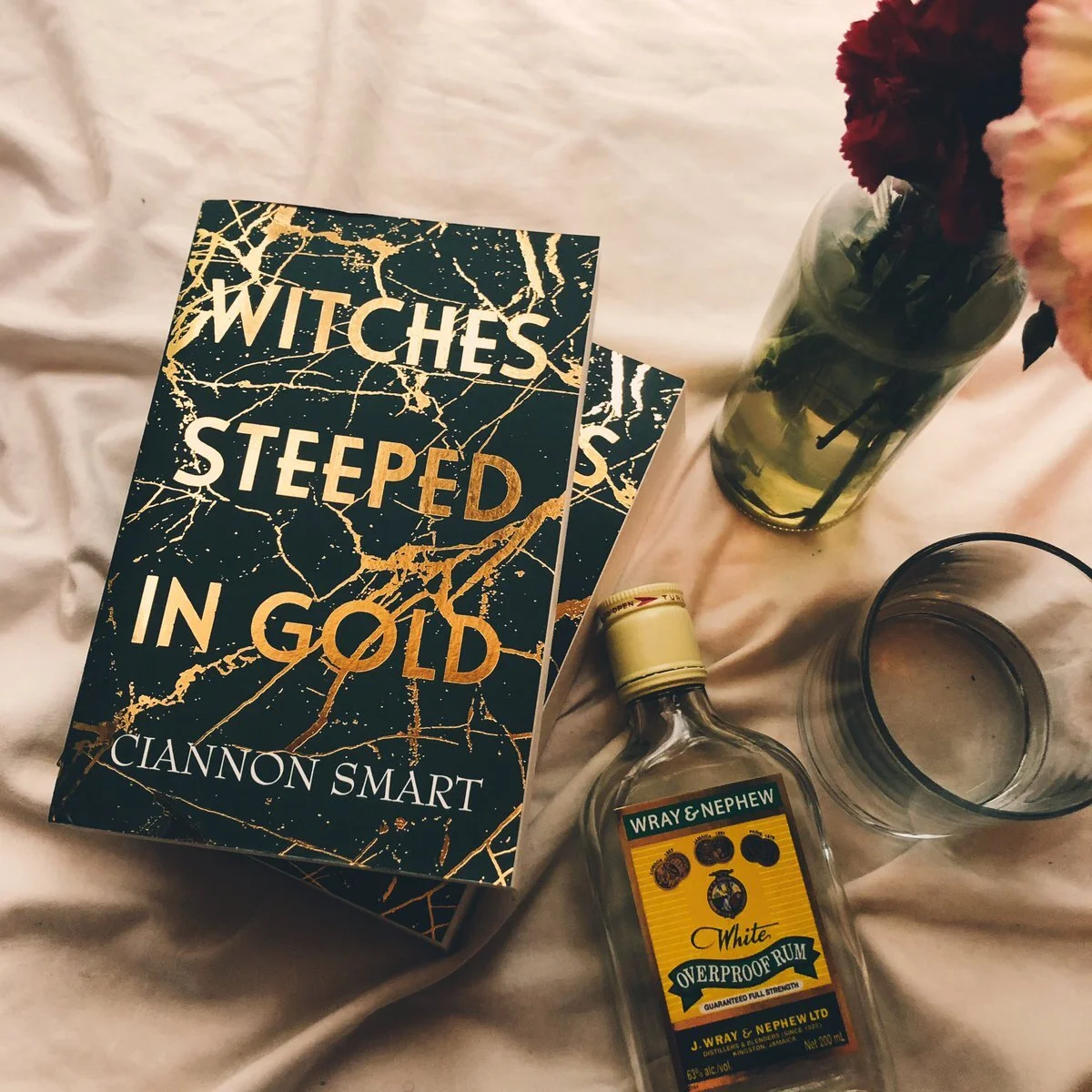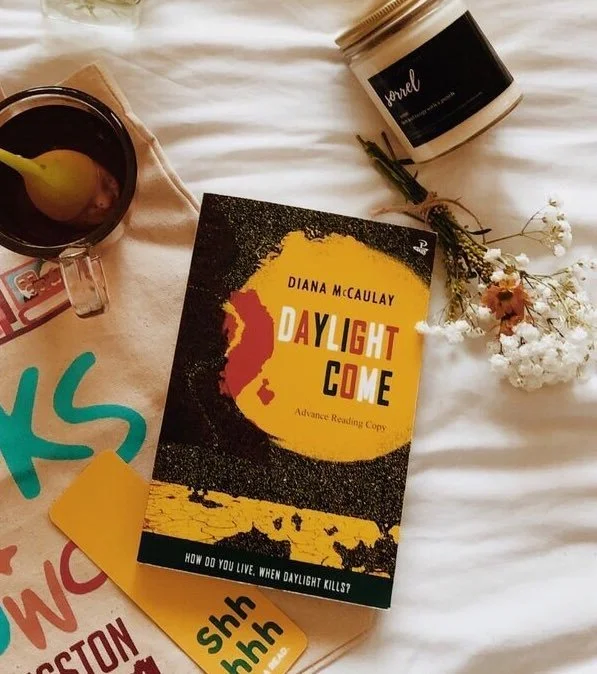Witches Steeped In Gold by Ciannon Smart
“This Jamaican-inspired fantasy debut about two enemy witches who must enter into a deadly alliance to take down a common enemy”
We need to discuss in our own Council meeting, the weight Caribbean-diasporic writers carry in their depictions of the places they hail from. Initially, I thought maybe Witches Steeped in Gold isn’t the right book to have this conversation around because it’s a fantasy that totes itself as being ‘Jamaican-inspired’ but honestly, what does that mean? When people say they feel “immersed in a new culture” that is an aesthetically-curated amalgamation of lifted words, names, places, and icons, are we drawing inspiration or leaning more into the genre of ‘Wakanda-fication’?
There is a hollowness to this story that I think can be summed up with one example drawing from the stilted, awkward patois used. “Yea mon”—a tourist shirt quotation, the identifier of a foreigner trying out the Jamaican-twang and “patwa” for their friends, the dreaded response to your affirmative answer of saying you’re Jamaican, is now repackaged as a staple saying of the Jamaican-inspired fantasy island setting of ‘Aiyca’, along with “whahan” as opposed to the actual “wha gwan”. These are sprinkled within long standard English to the point where it feels like an alarm reminder that yes, we are still on an island. So much of this novel read like reminders of this fact, and I had to reign in my discomfort at first, because I wanted to like it. I was patient with the fact that this book was taking on the task to not only collect whichever cultural aspects of Jamaica it seemingly wanted to but also to explain them to an audience unfamiliar with the subject. But in turn that made it feel like I, as a Jamaican, wasn’t thought of being part of the readership for this book. It was uncomfortable to feel uninvited to my own cultural background, as I couldn’t recognize it in this depiction no matter how hard it tried.
And oh it tried! In pages and pages of world-building that didn’t actually describe anything. From ‘jerk-scented air’ to the pointed over-explanations of the names of places, the inclusions of “hidden” references to the real Jamaica, it felt more like the island I live on was the imagined one as the cherry-picked construction of Aiyca asserted itself on the pages. What could've been a vibrant, wholly unique, and unexplored dynamic in fantasy is, again, hollow. Casting a vocab-list of Jamaican words, place names and phrases does not build a world but it does work to destroy this one. The empty symbolic gestures that only barely essentialized the depth of many cultural experiences to invite foreign audiences into a palatable, hollowed-out Jamaica where Obeah becomes the name identifier for a magic-race of people and the Rastafarian colours, their tribal identifier. This was Jamaica made solely for an international audience to consume.
Along with these empty constructions of cultural referent, the plot itself followed a Young Adult (YA) blueprint so studiously that spotting the enemies to lovers insta-love pairing and every other worn trope, even the fun ones I enjoyed, were already fully and immediately realized in my mind because we’ve already seen it a thousand times over. I was more interested in what happened to make the resistance spy and Jazymne’s dead sister break-up, which was mentioned only once, and how queerness was handled on this imagined Jamaica than either of their interactions with Keridan, especially set against the backdrop of an overly convoluted political landscape. There was so much more we could pay attention to, and despite having the dual points of view (POVs), I felt like we didn’t see or know much at all beyond a surface level. The concept still intrigues me, especially how it’s framed in the book because as I read there didn’t seem to be this confrontation of grey moralities and switching allegiances I was promised—of who’s the hero and who’s the real villain—Iayara and Jazymne just went deeper into their presented frameworks and personally, I didn’t see much impactful change or development. Not to knock them too badly, but I don’t think either character had any of the political awareness required to be doing anything they are doing throughout this book—maybe book two will give the twist I was expecting and hopefully better-paced action, instead of a series of reactions but as of now, couldn’t tell you if I’d be willing to pick it up.
It’s disappointing and frustrating to feel this disappointed because this really could have been the story I’ve been craving. I, instead, felt isolated from the experience everyone else in the diaspora seemed to be having with this book. What connection to home are you feeling with this hollowed-out fictional Jamaica? Is it just a book that facilitates not having to step out of the familiar uninspired YA that is usually white but now features an ‘ethnic twist and a range of book-described: “chestnut to chocolate” women to “diversify” reading lists? Because I have to sit and wonder why “Jamaica-inspired” is more popularly marketable and palatable than actual Jamaican books, when I didn’t feel comfortable enough to finish this book. Stopping shy at where the plot itself was picking up but feeling so alienated from the work to continue.
I say this to continue the conversations we’ve been having on the care and the harm of creating works for the Caribbean that only push citizens and natives further into fiction. It’s more than just griping with the construction of this fantasy world, but how this fictional world aids in the mechanizations of erasing the real one, when readers are taken to approaching these “Caribbean-inspired” books, to dip their toes in realities of ‘new-to-them’ locales. There’s already a notable shift in who these stories are catered to and imagined for. The imagination of the author imposes ideal realities onto fiction and performs in an authority that should not be taken lightly. Books like these work to tell readers the author’s repackaged version of the island/ region, instead of allowing the rich cultures and imaginations of the islands and its nationals to speak for themselves. Diasporic fictions of the Caribbean can do better for us by facilitating the space and permission for the region to show itself in this world accepted, to speak through these pages, instead of having us read along silenced as our cultural richness is picked through and diluted in order to fit the author’s way of telling us about our culture. We should be moving away from ‘inspired tellings’ and towards collaboration and conversations with the imagined and the real, doing both worlds more good, and less harm.
—
Thank you Hot Key Books YA for sending us copies of Witches Steeped in Gold for review (& directly to our Jamaican address without hesitation!)
Justine-Marie Williams is a Jamaican writer, aspiring publisher and world-weaver, currently pursuing further studies in Public Texts and research in Caribbean Publishing. Her writing interests include actively freeing the frameworks of postcolonial literature into the unlimited and sensuous understandings for and by the people these stories are written for. Connect with her through Instagram @sunnnmarie
We publish new articles in our digital Literary Magazine every Friday.
Our magazine is funded by sustaining members, well-wishes and vibes. Support the growth of our magazine by becoming a sustaining member and send the vibes by leaving a comment below.










What is your approach to ageing? Are you desperately keeping the grey hairs and aches at bay or are you anticipating the embrace of a slower paced life, possibly in retirement, or faster paced life completing the bucket list. This brief look at ageing in Like a Mule Bringing Ice Cream to the Sun nudges at these questions.